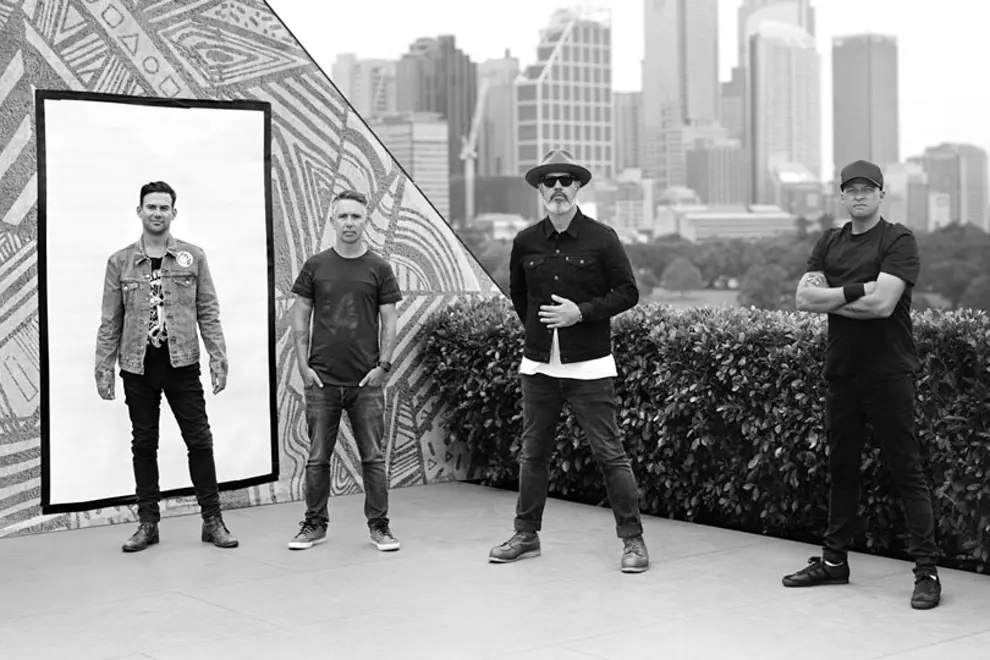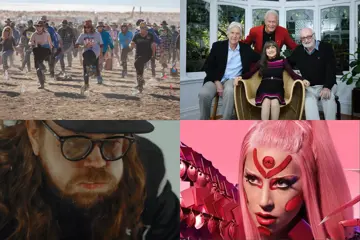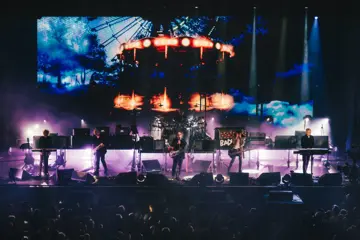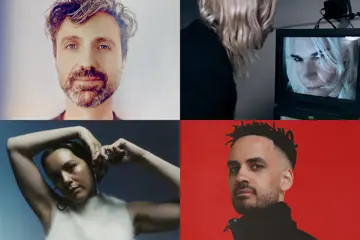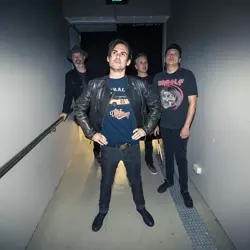 Grinspoon
GrinspoonPhil Jamieson: It was all the songs we'd ever written in our lives to that point. The way the writing would work is Joe would bring a riff into the rehearsal room in South Lismore, Sound Solutions. Joe or Pat would bring in a riff and then we'd try and meld it together in a sort of a jammy kind of way. I might write a riff. But there were never writing sessions, we were just rehearsing...
Pat Davern: ...To do gigs...
PJ: To do gigs, so we could buy weed. Well, so I could buy weed. We met a jam night so... we wouldn't call them writing sessions - that would have seemed too presumptuous.
Joe Hansen: Yeah, yeah, that's a bit highfalutin probably for the situation at Sound Solutions. I guess it was like a pretty dodgy little rehearsal room.
PD: It was a shithole. There were cockroaches all over the walls.
JH: It had drapes around the walls for sound, so if you moved the drapes to try and find a power point or something, there would just be cockroaches scattering everywhere. I think one time half the ceiling fell out.
PD: Yeah, like asbestos came down.
JH: It just collapsed, fell in and there was a lot of dust everywhere and we decided to take a break at that point.
PJ: I think we recorded the 16 songs that were on Guide To Better Living, 17 with the hidden track, and then Busy, Explain and Green Grass Meadow, which has just been released now. So all up we tracked like 20 songs or something. But then Champion, PEA [Post Enebriated Anxiety] and Sickfest were already recorded, so do the math. It was all the songs we'd ever written. Nothing ever got kind of thrown out, except maybe Water. But maybe that came later. Remember that 5/4 piece of shit?
Kristian Hopes: They were all pretty short [songs]. We wanted to give people value for money.
PJ: It was what everyone did back then. I think Frenzal... you just put lots on songs on the record.
KH: Spiderbait.
PJ: Spiderbait had 17 at least.

Don't miss a beat with our FREE daily newsletter
JH: We didn't think too much about it, we just put them all on. And also, I think at the time, Universal wanted to actually make it into a double album. Debut double album.
PJ: Use Your Illusion. Guide To Better Living I, Guide To Better Living II.
PD: We should have probably done it.
JH: That would have been a statement, wouldn't it? Yeah we had all these songs, I don't think we thought about paring it down too much. We just put them all on.
PJ: If the songs were good live, then we'd record them. We'd go from Sound Solutions and play a gig at the Richmond Tavern and if it worked, then we recorded it.
PJ: We were moving into a mansion in the hinterland of Byron Bay. We were making our own Funky Monks documentary. We were getting tattoos, we were recording at four in the morning, we were deciding whether to masturbate before we record or after. You know, these things we all saw in these amazing documentaries or rockumentaries - that was what was going on. There was a pool - there was a pool at the house. Kris' drums were set up in the lounge room, it was an incredibly exciting time. So looking back on it, we were full frothing brah.
PD: When triple j unearthed us, we'd gone there [to Rockinghorse Studios] and recorded Sickfest and Throw.
PJ: Had we?
KH: Yeah, that's where they recorded us.
PD: So I think that that may have had something to do with [returning there]. We had Phil McKellar who had recorded those songs, we got him to produce the record.
KH: And there was other mates of ours bands around doing that studio and we wanted to get to that level. I think Juice did it.
 PJ: It's also a really nice spot.
PJ: It's also a really nice spot.
PD: We recorded pretty live. I mean my guitar case was set up in one of the bedrooms. We actually ran a multicore from the main studio space, we didn't use the live room in the studio, we ran a multicore into the house. Kriso was set up in the corner. And everyone was kind of set up around him. We basically played every song live a couple of times. We were under the constraints of recording to tape, so we couldn't do too many takes and there was no click track.
KH: Well there actually was. There was only for Truk. We kept stripping it back, because it just wasn't working with the band, then I did it to click on my own I think.
PJ: To Truk?
JH: Not the other songs.
KH: No, not the other songs.
PJ: That's why Truk sounds good. Everything else sounds so bad. So yeah, back in the day, obviously no computers.
JH: No Pro Tools.
PJ: Recording to tape. We couldn't afford a lot of tape, so there was a limited amount of takes we could do. Just even convincing Phil McKellar to record Protest, which is the hidden track, was a battle. He was like, "How long is it?" "It's thirty seconds, just let me do it."
KH: We thought [Phil McKellar] was great.
PJ: He did a great job. He also recorded Champion and PEA for us for [EP] Licker Bottle Cozy, and those kind of songs got us a deal. He was just great with us. He knew what to do, he was a lot of fun, and really mellow kind of influence. Yeah, brilliant.
PD: We went back to him.
PJ: We've used him many times.
PD: He's not a producer like the kind that goes, 'No, that chorus doesn't work there'. He's more of a...
PJ: Organic. Let it happen.
PD: Making sure that everything's there for you - mics are in the right place and you can just do your job.
PJ: Giving you the ability to record to the best of your ability. Making it easy, and just also kind of mellow.
KH: And he was also helping us with different instrumentation. Like moods and stuff. He liked to try weird stuff...
PJ: ...So did we...
KH: ...and push us into it.
PJ: So it was good. I had a really old Yamaha synthesiser that I'd bought at thrift store and I also had a bunch of samples I wanted to use, the oranges and lemons vocal and the vocal samples in PEA as well were just cut out of vinyl records I had as well, like speeches at Geelong Grammar School. Just stuff that I wanted to put in here and there. I don't why, I think it added to the character. Yours ears pricked up a little.
KH: I think we were just all new to what we were doing. So we were all finding our feet.
PJ: I remember having a ball. I was 19. We were just writing songs, and head down having fun. We weren't incredibly successful at this point. We'd just gotten signed and Champion was kind of doing reasonably well here and there.
PD: Still living in Lismore.
JH: So we definitely didn't overthink it or second guess much about. We just went in there and did it.
PJ: Just do what we do. It was natural.
 PJ: It had a pool man, I was loving it. It was February in the Byron hinterland. It was so hot.
PJ: It had a pool man, I was loving it. It was February in the Byron hinterland. It was so hot.
PD: I didn't go in the pool once.
PJ: You were too stoned.
PD: It was green.
PD: Phil came in with the chords [to Just Ace]...
PJ: Chords and melody.
PD: ...and I'd been listening to...
PJ: Front End Loader
PD: ...Front End Loader. They did very major melodies, you know what I mean. So I thought it's in G, I'll pick out a G major scale and I'll write a melody around that, which I'd just never kind of put that much thought into a song probably ever, like working out what key it was in and what scale to play. I thought well if I'm going to write a major melody I'll do that. And then I did that and it came together from there. And then the riff wrote itself.
PJ: Scalped was written in the winter of '96... summer of '96... but it felt like winter in Melbourne at the Arthouse hotel. About a chap that had an accident at work and lost his hair - he got scalped. Healthy at 71kg, so he survived. Basically a 3/4 thing.
JH: It's almost word for word isn't it?
PJ: Yeah. I literally just stole the whole lyric from a newspaper article. If you read our lyrics, it's literally word for word. It's a fun song. After I think we went to Railrider and then we finally had a breather at Scalped. It's a pretty furious opening, the first five. So Scalped especially, now that we're playing it through live, we're like, 'Okay, get a breath', then I think we head back into Pedestrian.
JH: I don't think we've ever played Scalped live. We recorded it, never played it.
PJ: It was just kind of an album track, because it needed a breather. And it's kind of a curiosity, which I like. And I think Bad Funk Stripe is a curiosity as well, but it works in the balance of the record as well. It came from my hatred of university students playing bad funk.
PD: I think because the song lent itself to a bit of extra instrumentation, we just thought, yeah, let's just do it. Let's have a guitar solo on there. Let's get our buddy to come in and put some Mellotron or something on there. And we didn't have any other songs like that.
PJ: And it's also a bit wordy and a bit mysterious. Like it's kind of a poem, so it's the opposite to Pedestrian in some ways. And it works. I really love playing it. It's like a nice 'hooooo', get to hit the high notes. It's cool fun.
 PJ: There was a few [titles] I was throwing around. Probably. Songs Of Hope And Praise Volume One.
PJ: There was a few [titles] I was throwing around. Probably. Songs Of Hope And Praise Volume One.
JH: Anyone For Tennis?
PJ: Like they were all jokes ones you write on the wall.
JH: I think we had the big bit of cardboard and everyone could write their suggestions. And of course no one put any serious suggestions up.
PJ: This is a waste of time.
JH: Dick And Balls and stuff.
PJ: DA.
JH: Just ridiculous, stupid...
PJ: Classic teenager crap. Guide To Better Living was obviously the one.
PD: There were probably some pretty good album titles up there, really.
KH: Did anyone keep that fucking cardboard?
PD: I like [Guide To Better Living]. It captures a time and a place. When things were simpler.
JH: There's a few overdubs and extra stuff, but there's not a whole lot of it. It's pretty raw, it's like a lot of probably debut albums in that it's just the band…
PD: Honest.
JH: Yeah, honest recording, not too much extra frills. When we thought if you're going to play an album front to back, you want all the songs to be good. Because if you get to having to play all this filler and stuff... and I think it is all good. I enjoy playing these songs.
PJ: We wouldn't be doing this tour if we didn't like it, I don't think. It's testament to the fact that I think 20 years is enough time as well for us to go back and...
KH: ...forget [laughs]...
PJ: ...not be part of it. I haven't listened to the record in ten years or more. And I've got a lot of affection for it and I can't wait. It's a really fun record the way it goes from start to finish. It would be really disingenuous of us to do a tour if we hated it. So the reflections are fond.

